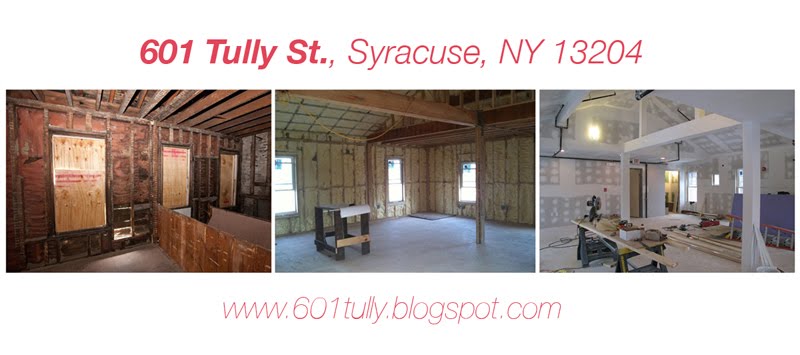About 601 Tully
Check out our new website! 601Tully.syr.edu
601 Tully is a center for engaged practice in Syracuse, NY developed by artist and professor Marion Wilson with a rotating collaborative team of 54 students and neighbors and Anda French of French 2Design. It's a site for meaningful exchange between artists, community members, and scholars in the co-production of culture.
601 Tully includes a contemporary art space, a public events space, a bookstore, a teaching garden, and Recess Cafe West.
In 2009, Wilson purchased the condemned two-story home and local drug hub, and throughout five semesters, Wilson's design/build class re-zoned, designed, renovated and now sustains the physical and programmatic aspects of 601 Tully. The collaborative team has consisted of artists, architects, environmentalists, Fowler High School students, Green Train Workforce, neighbors, and the occasional passerby.
601 Tully is made possible by the generous support of the Syracuse University School of Education, The Kauffman Foundation, The Near West Side Initiative, Imagining America, Home HeadQuarters Inc., Say Yes to Education, and National Grid.
Find us on Facebook!
Friday, August 24, 2012
Monday, August 13, 2012
Sunday, August 5, 2012
Friday, August 3, 2012
7th graders from Blodgett School planting tomatoes in a bathtub that they upcycled and transformed into a raised bed.
"Asking someone to plant something is a powerful gesture. That person is entrusted the well being on the plant and it surrounding. This is a small step in community building, as well as character building. As an artist-in-residence at 601 Tully, Syracuse, New York, I'm honored to play a role there." Tattfoo Tan
(Video courtesy of Tattfoo)
"Children do need a lot of exposure to nature. They need to play, plant, harvest and get their hands dirty. You don't need to travel far away, we can do this even in the city." Tattfoo Tan
(Video courtesy of Tattfoo Tan)
Through July we hosted one of the Say Yes summer camps on Thursdays. Our curriculum guided the students through an exploration of the plant world via the mediums of poetry, art and horticulture. We asked them to imagine and draw what they would look like and what 'fruits' they would produce if they were plants. They wrote poems describing these alter egos. They concocted Latin names, their genus and species, that best described the features of the plants drawn and described. The campers then brought all of this creations together into distinct ecosystems that they created, working together to figure out the environmental conditions and the landscapes necessary to support these plants as communities.
Some of the highlights included the responses "Something that you love" when we asked what an ecosystem is, and "A place where everyone helps each other" when we asked what a community is. Brother Maars (the talented local artist currently on exhibit in the gallery) co-taught an art session with the boys. When he asked them if any of them had ever worked on a piece of art for five months one eight year old boy immediately replied "Of course. It was just a collage but it was a complicated piece". They also grabbed a few minutes to rock out on our 'stair banjo', made by Zeke Leonard.
The creative potential that every child has is incredible and we hope their experience at 601 will be play a part in their development as cultural producers. All of their work was recorded in notebooks which they personally customized and brought with them at the end of their last session as an artifact and a record of their work.
Many thanks to the Say Yes program for running these summer camps and for collaborating with us!
